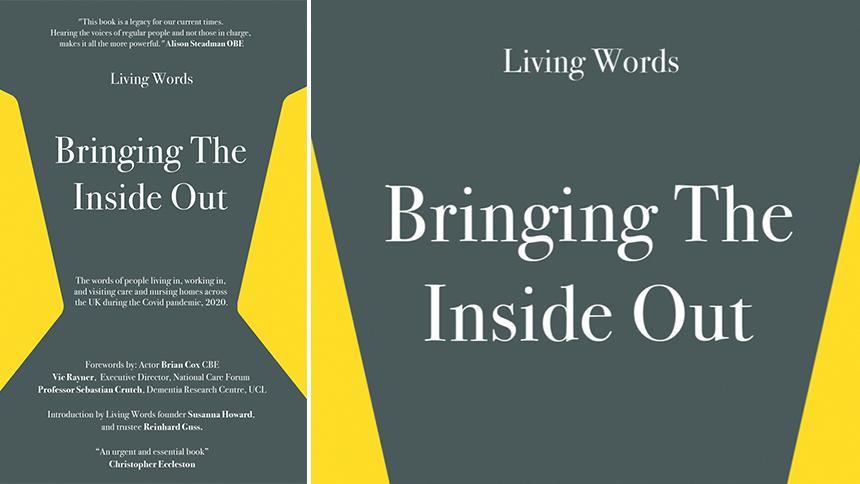Book group: Bringing the inside out, by Living Words
We read a groundbreaking book that lays bare the pandemic’s impact in care homes.
Our choice of book this issue – Bringing the inside out – shares the words of people who’ve been living in, working in and visiting care homes during the COVID pandemic. As such, it was never going to be a light read.
‘I had to read this book in instalments,’ says Andy Woodhead in the Vale of Glamorgan, who has vascular and Lewy body dementia, ‘firstly to be able to internalise and give justice to what was being said, and secondly because many of these insightful accounts of suffering made me feel very emotional.
‘The realism, pain, anger, emotion, kindness, compassion, dedication, humour and humanity shouted out to me as I turned each page.’

Poetry in motion
The book comes from the arts and literature charity Living Words, using what they call the ‘Listen Out Loud’ method.
‘This is a kind of creative transcription,’ explains Tomas René, in our Publishing team, ‘where, “The speaker speaks, the writer writes, and the way the words land on the page represent how the person has said them.” The speaker is involved in the editing so that they have ownership over the process.
‘The result is that the pieces capture the freshness and spontaneity of conversation. But with their frequent line breaks, they resemble poetry on the page, sharpening the impact of the words. It’s a book of brief but powerful impressions.’
Heather Ritchie in East Sussex supports her partner, who has dementia. She says, ‘Rather than just read people’s thoughts and feelings silently, I read them out loud. This brought me closer to the person, especially as it was written down as it was said.
‘Sometimes I could hear an accent as I read it out. For me, it was poetry in motion. It helped me get the emotion behind the words, to connect with that person. To hear and feel a little of what they may be feeling.’
Hope and courage
Having just finished the book, Ruth Smith in Surrey said, ‘Again I have tears in my eyes. I can really relate to the authors of the words, as my Nan is in a home and I haven’t been allowed to see her since September. She has dementia and I have no idea whether she will remember me when I can visit.
‘The guilt that is expressed, I feel that. If I hadn’t put her in a home, we would still be able to have contact. It’s illogical, as I couldn’t cope, but emotion and love isn’t logical.
‘The book has also been a comfort. I am not the only one going through this and I am not the only one feeling this way. In the words of Catrin, “Hopefully next year will be different.”’
Christopher Peacock, a carer and Society volunteer in Hampshire, says, ‘For the first time, and not before time, carers, relatives and residents are given their own voice amid the headlines. It is intimate, painful, compassionate and it will break your heart.
‘The book describes what it was like inside our care homes in the early months of the pandemic, the sense of abandonment. Carers speak of doctors not coming, ambulances did not call and still the death toll rose – and we knew nothing about it.
‘But amid the emotional darkness this is also a story of gut-wrenching courage and true grit. Perhaps we have never really known the debt we owe to our carers when we need them. There is an astounding light shone here.’
Andy agrees, ‘I found this an honest, insightful, raw, tragic and emotional account of the issues faced by the residents in care, their loved ones and carers in these unprecedented times, with a deadly pandemic that has affected care homes more than we could have ever imagined.
‘I also managed to find within its pages immense bravery and the blessings of humour in the face of adversity.’
Read and act
The potential for the voices featured in this book to have a much wider impact was evident.
‘Each person’s voice – whether of someone with dementia, a relative, carer or care worker – is equally important in their own right, but they also report a collective trauma,’ says Tomas. ‘This book gives them a vital opportunity to be heard.’
Heather says, ‘I think every politician, every person who has or does or will make the decisions about people living with dementia in a care home, their wellbeing, their carer or loved one – during this or any other lockdown or crisis – should be given this book and pledge to read it and act on it.’
Andy, also looking ahead, says, ‘I hope that when agencies and governments, central and devolved, sit down for their enquiries and studies of the effect the pandemic has had, particularly on care homes, as they inevitably must, they will read this book as perfect and honest evidence, from all sides of the care home agenda.
‘I cannot stress highly enough just how important a contribution this book will make.’
Bringing the inside out: The words of people living in, working in and visiting care and nursing homes across the UK during the COVID pandemic by Living Words (Living Words 2020), 234 pages, £8.99, ISBN: 9781527280601.



